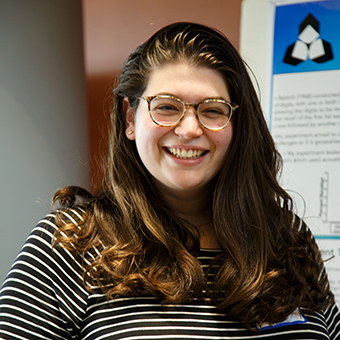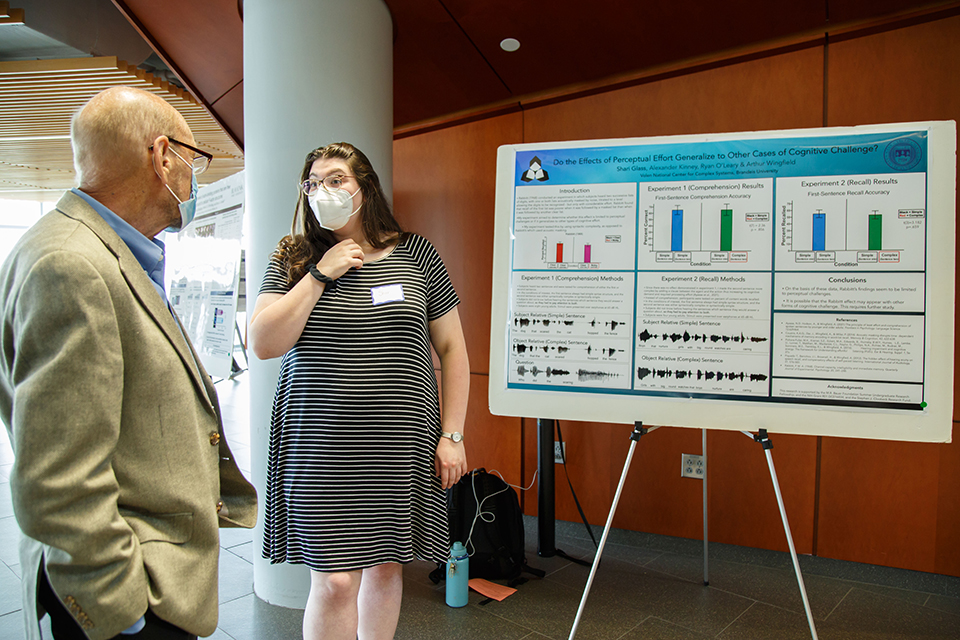Shari Glass
Wingfield Lab
Department of Psychology
Brandeis University
Do the Effects of Perceptual Effort Generalize to Other Cases of Cognitive Challenge?
 In 1968 Patrick Rabbitt (Rabbitt, 1968) conducted a simple experiment that altered the landscape of our understanding of mental effort in an unforeseen way. Subjects heard two successive lists of digits, with one or both lists acoustically masked by noise titrated to a level allowing the digits to be recognized — but only with considerable effort.
In 1968 Patrick Rabbitt (Rabbitt, 1968) conducted a simple experiment that altered the landscape of our understanding of mental effort in an unforeseen way. Subjects heard two successive lists of digits, with one or both lists acoustically masked by noise titrated to a level allowing the digits to be recognized — but only with considerable effort.
In the condition of interest, after both lists had been presented, subjects were signaled to recall a first clearly-spoken list. Rabbitt found that the first-list recall was poorer when it was followed by a masked list than when it was followed by another clear list. This demonstration was followed by others showing that words degraded by noise (or hearing loss) were less well recalled than clearly heard words; paradoxically, even when the degraded words could be shown to have been recognizable (Piquado et al., 2012). This led to a "perceptual effort hypothesis" with a deep literature verifying its reality (Cousins et al., 2014; Pichora-Fuller et al., 2016).
The current studies aimed to test whether Rabbitt's effect is limited to perceptual effort or whether it can be shown to be a more general phenomenon than currently emphasized in the literature. The question is whether the cognitive effort needed to understand a syntactically complex sentence operates in an analogous way to purely perceptual effort on memory.
I conducted two experiments. The first experiment involved the presentation of two simple (subject-relative) sentences, two complex (object-relative) sentences, a simple sentence followed by a complex sentence and a complex sentence followed by a simple sentence, followed by recorded instructions to answer a comprehension question about the first or the second sentence after both have been heard.
The second experiment involved a similar design to the first, however, it used a simple sentence with a short gap distance between the agent and the action, while the complex sentence employed a long gap format between the agent and the action thus increasing its cognitive demands and consequent processing effort (Ayasse et al., 2021). In addition, recall was measured instead of testing comprehension. Neither experiment showed a detrimental effect on first-sentence comprehension or recall when the second sentence was syntactically complex relative to when it was simpler. Based on these findings, Rabbitt's effect of perceptual effort does not necessarily generalize to all forms of cognitive effort.
Personal Statement
The opportunity to work in the Memory and Cognition Lab at Brandeis has proven to be a worthwhile and informative experience. I have gained and exercised skills such as learning to work collaboratively on a study, collecting data and analyzing results. I did this mainly through crafting and executing my experiments. I was solely responsible for testing participants and the collection and analysis of data, which was incredibly valuable as these skills are generalizable to my senior honors thesis and future academic research. In addition, the opportunity afforded to me through the M.R. Bauer Foundation Summer Undergraduate Research Fellowship allowed me to build confidence in myself and my work. This assurance cannot be taught in a classroom, but rather only learned through experiences and self-realization.
Before this summer, I often refused to trust my own work and judgment. However, by the end of the summer, I believed in myself as a scientist and researcher. No matter the setback, which inevitably occurs in research, I believed in my ability to solve it and proceed with the experiment. This is a priceless skill I look forward to using in my future. This summer was an amazing opportunity and I am truly grateful to the M.R. Bauer Foundation for making this possible!
Giving Back Reflection
During the COVID-19 pandemic, I decided to learn how to crochet winter apparel such as hats and scarves. This summer, I was lucky enough to put this fun hobby to good use! I crocheted winter necessities for children and adults of all shapes and sizes experiencing homelessness in the greater Boston community. Although the summer heat seemed strong, Boston's frigid winters were only a matter of months away. Hopefully, this contribution will help protect individuals from the harsh winter around the corner!
